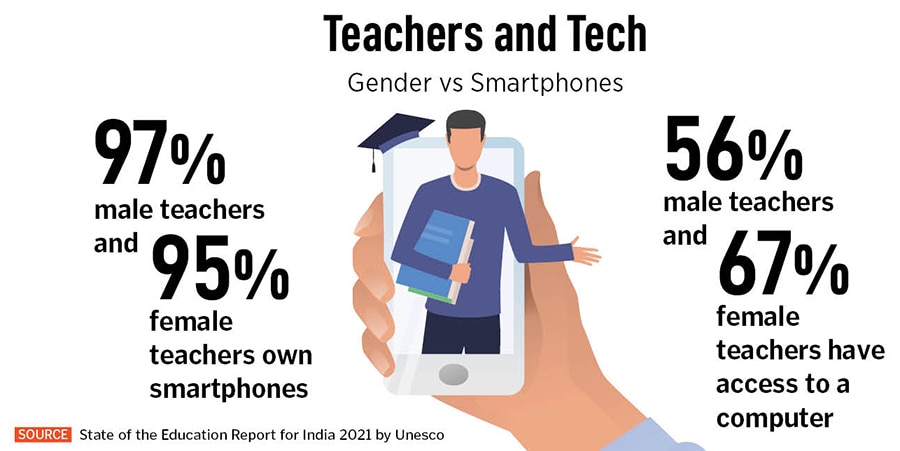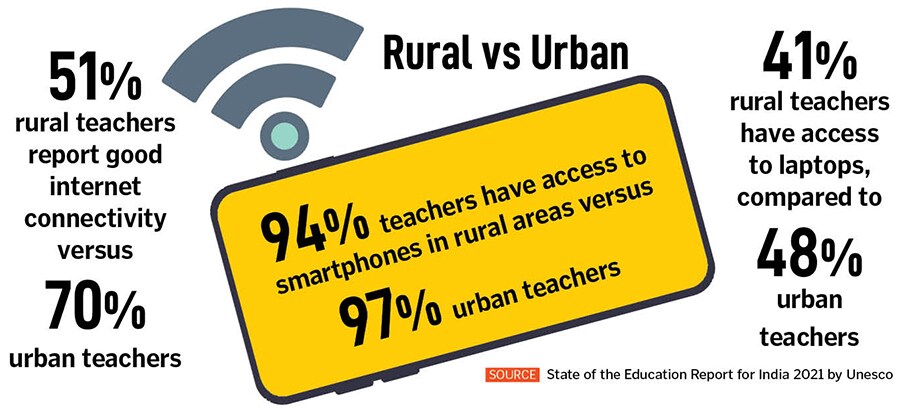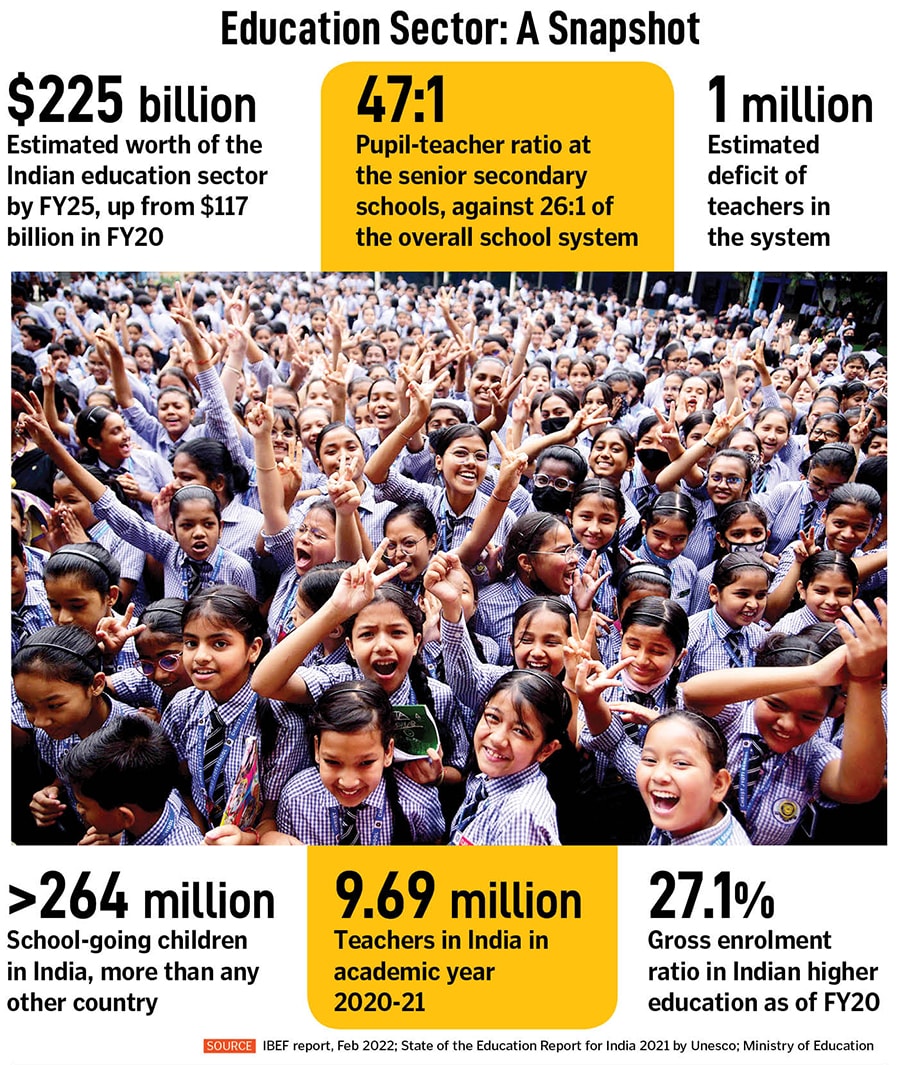The constantly evolving educators of edtech
In the wake of layoffs, hybrid models and changing business strategies in a struggling edtech sector, teachers are having to adapt and reorient as never before


Shilipi Chatterjee is in a classroom for the first time. The one with a chalk, blackboard and children sitting in front of her instead of on the other side of a computer screen.
It’s a new experience for the 25-year-old BEd graduate from Delhi, who had only taught in an edtech setup before. It is perhaps not something Chatterjee would have considered as an immediate career step, had she not been laid off in April from her job as a teacher at edtech startup Udayy.
The Bengaluru-based venture for kindergarten to class 8 students shuttered after three years of operations, as there was no clear path to profitability, laying off about 100 to 120 employees, as per media reports. “Despite having several months of runway in front of us, we made this decision because neither did we want to burn investors’ and LPs hard-earned money nor did we want to waste teams’ time on a business which we knew was doomed to fail," said co-founder Mahak Garg in a LinkedIn post.
Chatterjee speaks fondly of her time at Udayy and how the co-founders handled the unfortunate situation with maturity, transparency and respect. She also received a severance package until June. “But what after that?" she says, recollecting how she scrambled to find a job.
Chatterjee has found a temporary job as a primary teacher in a Delhi school, and is on the lookout for permanent employment. She is clear she wants to remain in offline educational setups, both from “job security and job satisfaction point of view". While edtech formed the foundational step of her career, being laid off has changed her outlook. “I feel career growth is tremendous offline, and will consider edtech only if I do not get any job at regular schools," she says.

Chatterjee is among the many teachers who have been reorienting their careers or their approach toward their existing jobs in the wake of the many changes that have gripped India’s edtech sector. Funding is slowing down, investors are becoming more cautious, valuations are falling, people are being laid off, and the reopening of schools and colleges has made edtech ventures come up with alternative models, such as an online-plus-offline approach.
This is a stark difference from the past two years. Edtech companies were among the leaders of the digital transformation that followed the onset of Covid-19, as learning from home became the norm.
An October 2020 report by Inc42 Plus estimated that edtech’s market size will grow 3.7x—from $2.8 billion in 2020 to $10.4 billion in 2025. Another report by venture capital (VC) firm BLinC Invest, published in 2021, said there are over 9,000 edtech startups in India, with offerings across classes 1 to 12 “projected to increase over 6.4 times to create a $1.7 billion market, while the post-K12 market is set to grow 3.7 times to create a $1.8 billion market". The Indian Edtech Consortium that was formed this year under the aegis of the Internet and Mobile Association of India, says the edtech sector has generated more than 75,000 jobs over the past five years.
The reasons behind the current quagmire is because many ventures did not focus on building a product that works, and relied on aggressive selling and false promises while learning outcomes remained poor, says Manan Khurma, founder of online math tutoring startup Cuemath. “There was a super customer-unfriendly way of growing businesses, and very few players managed to acquire customers at economics that made sense. I call it death by CAC [cost of customer acquisition]," he says.
What this means for teachers, according to him, is that while the number of platforms will now decline, the requirement for high-quality teachers will only grow among startups that remain standing. “You will have a lot more hybrid teaching coming in. We ourselves are considering whether we should allow our teachers to do both online and offline classes," Khurma says. “While some teachers will prefer online teaching, some others who have experience on these platforms will also start up on their own."
Yashraj Singh Chauhan, 26, is one such teacher. He had joined online test preparation platform Unacademy on a three-month contract in March. He was told to garner views for his videos and generate 30 percent of his base pay from his lessons to get an extended contract. Chauhan had been coaching students offline in quantitative aptitude and reasoning for banking, CAT and insurance exams in his hometown Jhansi, Uttar Pradesh, and had launched his YouTube channel, Veteran, in April 2020. He claims that many students joined Unacademy because of him. “In May, it [Unacademy] told me that while I was doing well from a revenue standpoint [with regard to the base pay metric], I was not getting the required number of views, or watch minutes," he says, following which his services were discontinued.
Chauhan—who had worked in two edtech startups before Unacademy—says he is confident of the value he brings to the table, and that he has a loyal student base. He determines his success through the difference he makes in the lives of students, which cannot be measured by the number of views. “My personal contributions to a student’s growth get subdued on large edtech platforms," he says. Chauhan has now decided to focus on creating his own edtech app, while restarting offline coaching.

Industry experts believe while not many teachers have been affected due to the layoffs, it is time to reskill to stay ahead of the game. “If I were a teacher right now, I would invest a lot in sharpening my skills, looking at what is relevant and make sure I do not get complacent," says Narayanan Ramaswamy, national leader, education and skill development, KPMG in India. “This could be a golden period for teachers who are genuinely passionate since there is an acute shortage of good teachers."
Even before edtech boomed into a billion-dollar opportunity, there has been a demand-supply mismatch between teachers and students in India. According to the Unified District Information System for Education, of the Ministry of Education, India has about 97 lakh teachers for 26.44 crore students in 15 lakh schools, of which about 10 lakh are government schools, as per 2020-21. The State of the Education Report 2021 report by Unesco says there is a deficit of over 10 lakh teachers at current student strength, “and the need is likely to grow".
Many people from the industry believe that edtech offerings can help bridge the gap to some extent with regard to massive shortcomings like infrastructure, teacher strength and quality that plague traditional institutions. The need of the hour is for edtech initiatives to complement educational institutions.
Mishra of CIEL HR says the edtech industry continues to attract teaching talent because of flexible work schedules, attractive salaries “could range from ₹25,000 to crores, depending on the seniority and role", and even stock options. “Edtech has also helped tap a new pool of part-time teachers who could have never considered teaching as a career option otherwise." And recruitment, he adds, is more skill-driven than qualification-driven.
Anand Prakash, co-founder of edtech startup Vedantu, says edtech has been solving accessibility issues, wherein teachers from cities can reach students in remote locations. “If the pandemic accelerated edtech, it is bound to slow down in one-two years. We just have to be resilient and not panic. Edtech will continue to grow after equilibrium is set, as it is solving an important problem of helping teachers reach Tier II cities and beyond, and help create a level-playing field for students there."

Around mid-May, Vedantu laid off about 7 percent, or 424 employees, out of 5,900. This was its second round of layoffs it had laid off about 200 earlier that month. Prakash says no teacher was laid off, and the few that were let go of earlier was because of annual performance evaluations.
The demand-supply imbalance has been there and “will remain even as we go hybrid, or transition from online to virtual reality or metaverse, whatever you call it", says Dipyaman Sanyal, head of academics and learning, Hero Vired, an edtech platform launched by the Hero Group in 2021. What is likely to change is there will be a clear quality differentiation, he explains. “In the next 12 to 18 months, the wheat from the chaff will possibly be separated, and that can impact faculty. Good quality faculty will still be in demand, and will be hired by quality organisations that will come out stronger."
The emergence of edtech has resulted in massive shifts in the way students learn, which will impact the role of teachers no matter what forms of delivery the industry adopts, says Ramaswamy.
Arjun Mohan, CEO of higher education startup upGrad, agrees that things have become more specialised in the online world. “It is no longer just one person in a classroom providing information, content and ensuring discipline," he says, explaining that while teachers deliver curriculum, there is a support system of people, like industry experts who help learners develop discipline and skills.
Akshay Munjal, CEO of Hero Vired, which offers ESOPs to all faculty members, says these days every teacher wants to “work in a setup where they have a sense of ownership and create value for themselves", and qualifications are not paramount while hiring at the startup. “In the edtech space, unlike universities, the faculty having or not having a PhD does not matter. What matters is how they translate or apply their knowledge."
This hiring strategy, Mishra explains, is resulting in people from various backgrounds taking up teaching jobs at edtech startups. Shivakumar Bavamala, faculty of finance and financial technologies at Hero Vired, is an example. Having worked in the financial services sector in India and the UK for over 15 years, he joined Vired last year because he wanted to help upskill young learners. But this also means being prepared to hustle harder to create content, deliver it and put together career opportunities for students, he says. He believes that a challenge for teachers, and edtech, is the difference that exists between sitting in front of a camera and being face-to-face in a classroom. “Tech needs to find a way to make students feel like they are sitting with their peers in their classroom."
Dinesh Vohra, head of the chemistry department at Ludhiana-based startup Edusquare, agrees that even the best of students can get demoralised in an online setup as it can be isolating. In his opinion, a hybrid system is the way forward. He is currently working in one such setup, wherein he teaches a group of students offline, while installed cameras and mics broadcast it live. Students participate remotely and type their doubts in a chat box. “This gives students an option. If they suffer from Zoom fatigue, they can come to the coaching centre, but if they are unable to attend physically for whatever reason, they can join remotely." Vohra admits that his working hours have increased, with the need to be available online and on WhatsApp to solve doubts, even at odd hours. “But now, slowly, students are also developing the maturity to respect our time, and teachers are figuring out ways to work more efficiently."
Sivia Goyal, co-founder of Edusquare, believes that once teachers are able to overcome the initial fear and mental block, the transitions will be smooth. “In fact, the senior faculty start replicating some of their offline engagement strategies online, and vice versa, which has good results."
While Shalini Lalwani, a teacher at Cuemath, believes that online is the go-to for her and many of her peers because of its flexibility, her colleague Swati Gupta says irrespective of the medium, the reason why you teach students, and the value addition you provide, should be identified. “To accept, adapt and prepare for change more easily, you have to realise that doing things the way you have always been doing them will not help you get a good output, and that you need to change for the better."
First Published: Jun 27, 2022, 12:56
Subscribe Now